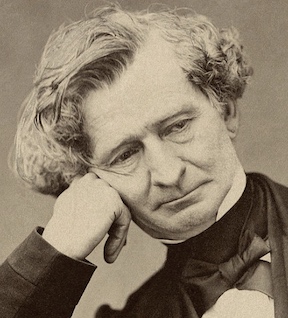On this date in 1803, musical composer Hector Berlioz was born in Dauphine, France. His mother was a devout Catholic. His physician father, an agnostic, expected Hector, who had a musical affinity, to follow in his footsteps. Repelled by the crude medicine of his day, he turned from medical studies to music when his cantata won a Conservatoire prize. He was awarded the Prix de Rome in 1830. The passionate composer was highly influenced by Shakespeare, writing three major works on Shakespearean themes.
He married actress Harriet Smithson. Now considered the father of French Romanticism, Berlioz was discouraged by French critics at the time, despite major compositions such as Symphonie fantastique (1830), Harold en Italie, Romeo and Juliette and overtures to King Lear and Rob Roy. In fact, his works were so original and sweeping that many regarded Berlioz as a musical lunatic. He was forced to become a music critic to support himself. Gradually, Berlioz found his recognition abroad and toured throughout the 1840s and 1850s. While not hostile toward religion, Berlioz had no religious affiliation and was widely known as an agnostic.
He died at home in Paris at age 69. (D. 1869)
PHOTO: Berlioz in 1863.


